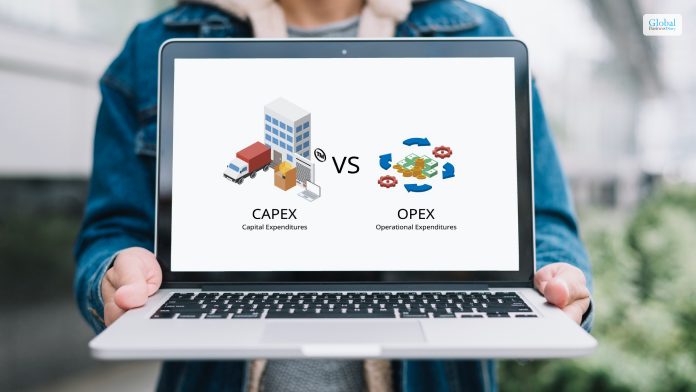Capex Vs Opex: Essential Points Of Difference

A company has to pay off different kinds of expenses to run its business smoothly. Capex vs Opex is one of the popular expense differentiation you must know. Among them, two kinds of expenditures are quite prominent in this regard. First is the Capex, and second is the operating expenses.
Most of the time, these costs can be one, and sometimes they can take the shape of recurring expenses. You must follow the correct process that can assist you in getting things done in perfect order. Micromarketing techniques can work well here.
The capital expenditure of a company will occur once, while the operating expenses will keep on occurring all the time. If you are a business owner, you must know the core points of differences between the two concepts.
Essential Points Of Difference Between Capex vs Opex

There are several points of difference between Capex vs Opex. It will offer you the complete insight once you go through the complete article. You need to know the reality while making the differentiation between the two concepts of business./
1. Nature Of Expenses
Capex vs Opex has some core differences in the nature of their expense model. Capital expenditures or Capex are investments in assets that provide long-term benefits to a company. These expenses are typically for acquiring, improving, or maintaining assets such as property, equipment, machinery, or infrastructure.
Operating expenditures are day-to-day expenses incurred in running a business. These include costs for salaries, utilities, rent, marketing, repairs, and other ongoing operational expenses. You must consider these facts from your end while making the differences between the two concepts.
2. Duration Of Benefit
Capital expenditures provide benefits over an extended period, usually beyond one fiscal year. They contribute to the company’s future productivity, efficiency, or revenue generation. Capex vs Opex has some significant points of differences that you must know while you make the comparison.
Operating expenditures are incurred for immediate use and provide short-term benefits. They are essential for maintaining regular business operations and generating immediate revenue. It will give short-term and regular benefits to your company.
3. Treatment In Financial Statements
Capital expenditures are recorded as assets on the balance sheet and depreciated or amortized over their useful life. Depreciation or amortization expense is then reported on the income statement over time.
Operating expenditures are immediately shown on the income statement in the period they are incurred. They directly impact the company’s net income for that period. You need to identify the perfect solution that can make things easier for you to reach your goals with ease.
4. Tax Treatment
Capital expenditures might be eligible for tax benefits such as depreciation or amortization deductions over time, reducing taxable income. Capex vs Opex, you must consider things at your end while reaching your objectives.
Operating expenditures are fully deductible in the year they are incurred, providing immediate tax benefits. You should get through this difference to have a better idea of it. Ensure that the scope of errors is as low as possible.
5. Impact On Profitability & Cash Flow
While CapEx affects profitability indirectly through depreciation expenses. It has a significant impact on cash flow at the time of purchase or investment. You cannot afford to make things work in the wrong direction from your counterpart.
On the other hand, Operating expenditures directly affect profitability by reducing net income and also impact cash flow in the period they occur. Effective planning can boost the chances of reducing the expenses of your business.
6. Decision Making & Budgeting
Capital expenditures involve strategic decisions as they impact the company’s long-term growth and productivity. Budgeting for CapEx requires careful planning and consideration of future benefits. You should know the core points of differences between Capex vs Opex. It will assist you in attaining your goals with complete ease.
Operating expenditures are part of routine budgeting and are necessary for maintaining day-to-day operations. They are generally more predictable and recurring. Without proper application of the strategies, things can turn worse for you.
Examples Of Capex Expenditure
There are several examples of Capex expenditure that you should know at your end. It will help you to get a better insight into it. Let’s find out some of the core examples of the Capex Expenditure that can make things easier for you.
- Machinery, manufacturing plants, and equipment.
- Computers.
- Building Improvements.
- Trucks and vehicles.
The contribution margin of the company plays a vital role here. You should pay it from your end to meet all the expenditure.
Examples Of Opex Expenditure
There are several examples present for Opex expenditure that you must know at your end. Some of the core examples of it are as follows:-
- Salaries and wages.
- Rent and Utilities
- Legal and accounting fees.
- Overhead costs.
- Business travel.
- Property expenses.
- Interest on debt.
- Research and development expenses.
You can easily make the market segmentation with the help of the differences between capex vs opex to meet the requirements.
How To Reduce Capital Expenditure?
There are several techniques you can employ to reduce the capital expenditure of your company to a great extent. You must follow the correct process in this regard to have a better idea of it.
1. Evaluate The Asset Needs
Conduct a thorough assessment of current assets to determine if there are underutilized or redundant assets. Selling or repurposing such assets can free up capital and reduce the need for new investments.
2. Leasing Vs Buying
Consider leasing equipment or assets instead of purchasing them outright. Leasing can lower initial costs and shift maintenance and upgrade responsibilities to the lessor.
3. Prioritize Essential Investment
Focus on essential investments that directly contribute to core business operations or strategic growth. Prioritize projects that offer the highest return on investment (ROI) and align with long-term business goals.
4. Implement Of Efficient Technology
Invest in technology that streamlines processes, reduces manual work, and improves efficiency without significant capital outlay. Cloud-based solutions or software-as-a-service (SaaS) models often have lower upfront costs.
5. Outsource Non-Core Functions
Consider purchasing refurbished or used equipment instead of new. Often, these options come at a lower cost while still providing adequate performance and reliability.
Final Take Away
Hence, if you are making the differences between the two concepts of capex vs opex, then the mentioned points can prove to be useful for you. Try to reduce your expenses as much as possible. It will reduce your debts to a great extent.
You can share your views and opinions in our comment box. It will help us to know your take on this matter. Once you follow the correct process, things are going to be easier for you. The application of the correct strategy can make things work for you.
Continue Reading For More Business-Related News!!













